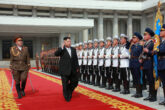January 13, 2017
Ties That Bind: Why Asian Alliances Will Survive Trump
On the campaign trail, President-elect Trump regularly denigrated America’s alliances, calling NATO obsolete and demanding that South Korea and Japan “pay up” or the United States would begin to draw down its troop commitment. Since the election, he has reportedly reaffirmed U.S. commitments to Tokyo and Seoul, but Trump’s Asia advisors have confirmed that he intends to press allies to increase their spending. Burden-sharing debates are as old as the security treaties themselves, but Trump’s alliance positions have created unprecedented angst in Asia. Partners worry that his transactional approach to international politics will transcend mere penny-pinching and lead him to abandon them altogether.
These worries have good theoretical grounding: Realist scholars of international relations have often characterized alliances as marriages of convenience, which form against shared threats and disperse when the foe is vanquished. U.S. alliances were, of course, designed in the early Cold War to contain the Soviet Union and to help rebuild postwar Europe and Asia. Both tasks were long ago accomplished, and yet, America’s treaty commitments have lived on and have been repurposed to contemporary challenges. Could the 2016 election be the beginning of the end for these longstanding pacts? As the incoming Trump administration considers a significant realignment in U.S. foreign policy, including an embrace of Russia and “deal-making” with China, perhaps the 70-year American experiment with security guarantee statecraft will also meet its demise — or so this narrative goes.
Read the full article at War on the Rocks.
More from CNAS
-
Trump’s Audacious Success
This article was originally published in The Atlantic. Nicolás Maduro and his wife awoke yesterday in a safe house on a heavily fortified military base in the center of Caraca...
By Richard Fontaine
-
North Korea and Russia’s Deepening Axis
2025 was the year North Korea turned a corner, not just through provocations, but by actively repositioning itself in the global power game. Its military partnership with Russ...
By Dr. Go Myong-Hyun
-
CNAS Insights | Eight Things to Watch for in 2026
Buckle up for a pivotal geopolitical year. In 2026, the world will struggle to make sense of U.S. actions and intentions, and Washington will remain uncertain about its own pl...
By Richard Fontaine
-
North Korea in Motion: New Moves, Sharper Risks, and Shifting Regional Responses
As 2025 winds down, tensions on the Korean Peninsula are escalating once again.North Korea is sending thousands of workers to Russian drone factories, stepping up cyber theft ...
By Dr. Go Myong-Hyun




